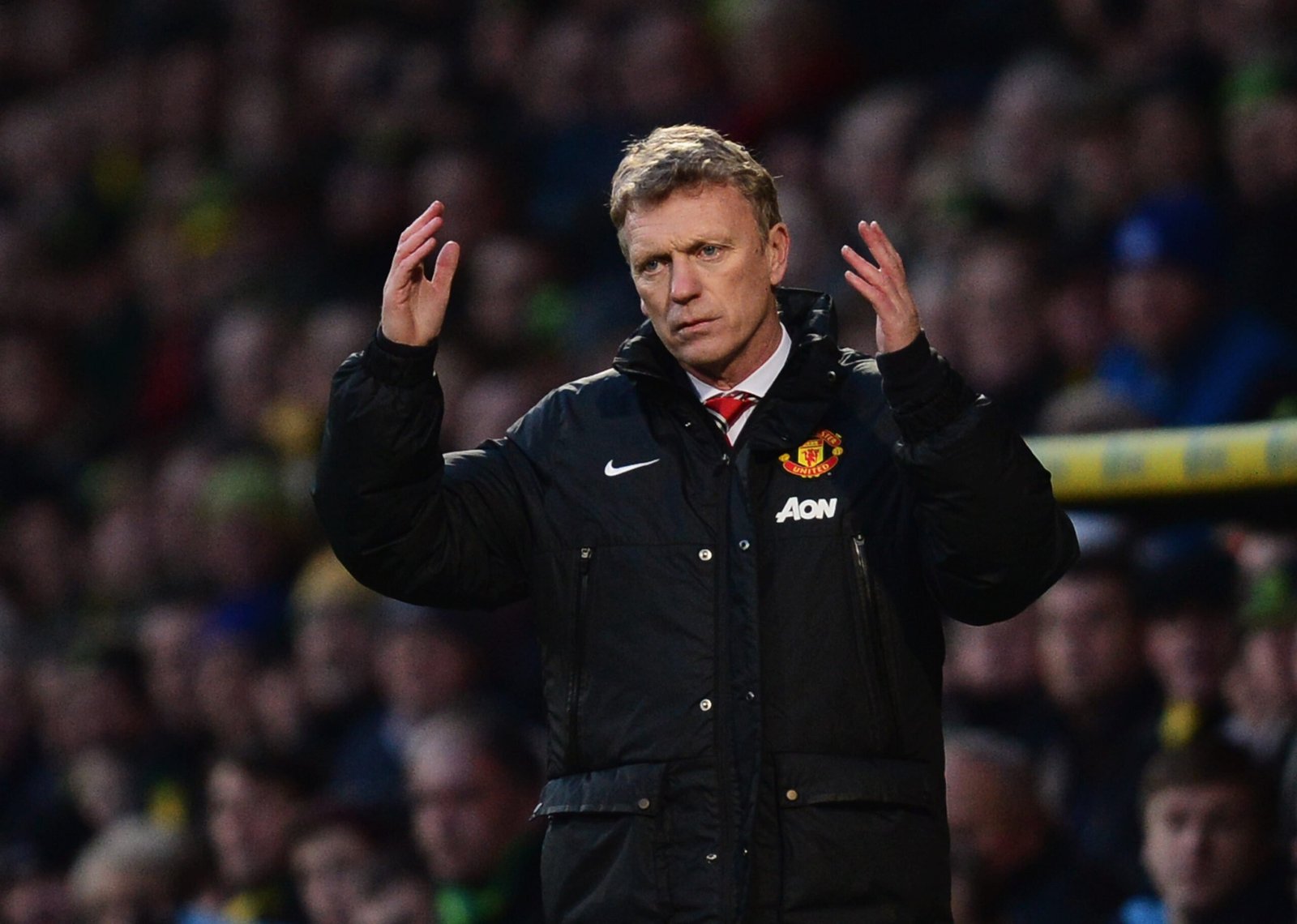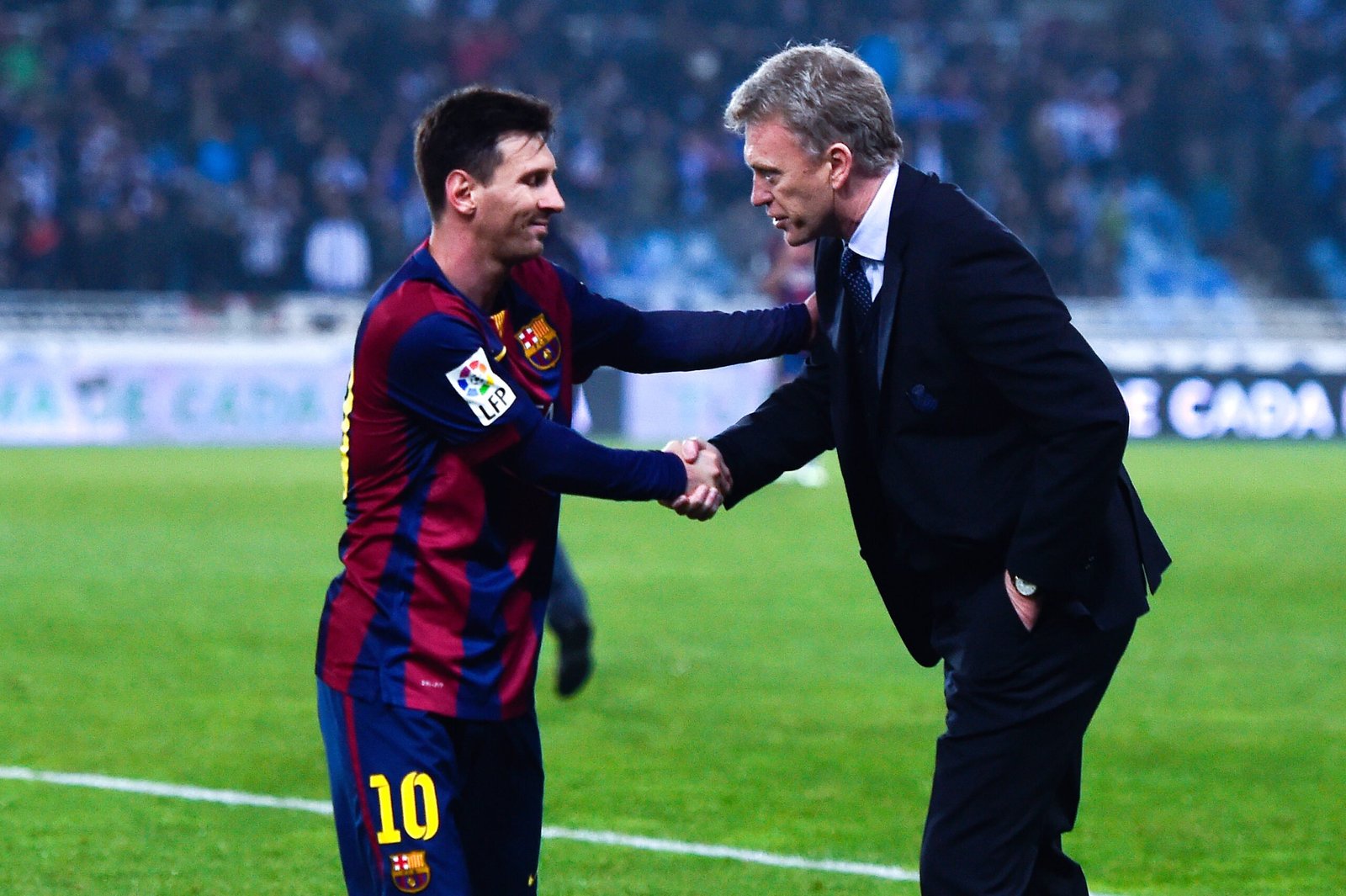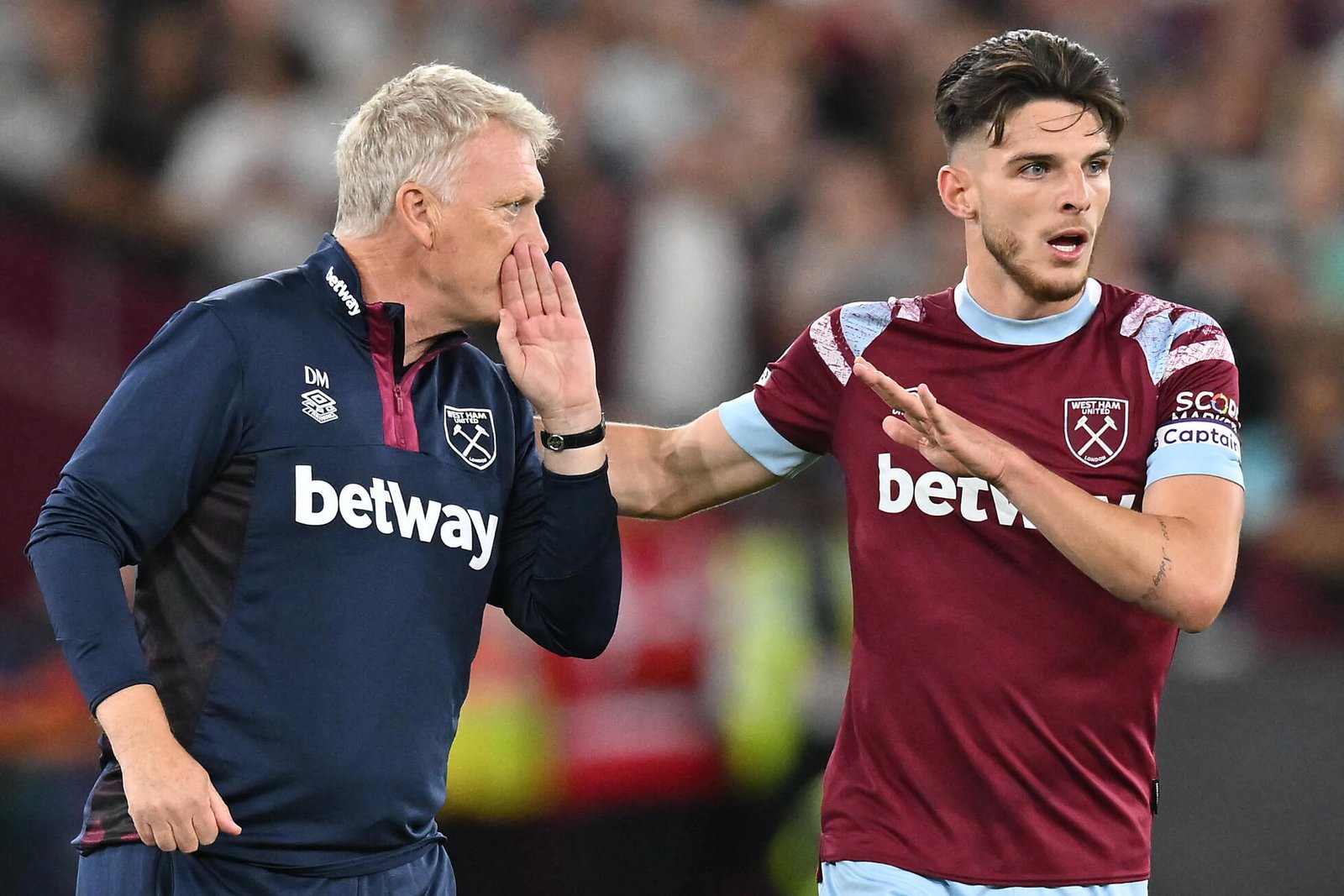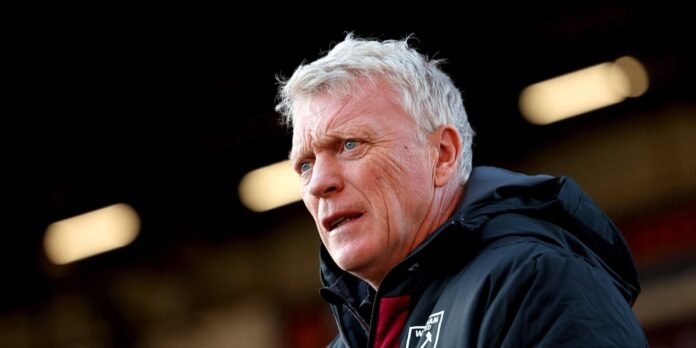After back-to-back Premier League wins against Manchester United and Arsenal in December, West Ham United fans seemed united in their affection for David Moyes.
But with his side winless in six games in all competitions, supporters are divided over his future once again.
Moyes’ contract expires in June, although he expects his situation to be resolved soon.
“We’ll get back on it now the transfer window is shut,” he said after the 1-1 draw against Bournemouth. “We’re well down the line and moving on with it. We’ll pick that up again in the next few weeks.”
Moyes guided West Ham to a European trophy in May and this season the club are seventh in the Premier League and into the Europa League knockout phase. But MoyesIn or MoyesOut will remain a topic until his contract extension is confirmed.
Does Moyes deserve more respect? Would West Ham regret changing managers?
We asked five of our writers who have covered his managerial career closely to answer those questions and more…
Does Moyes deserve more respect for what he has achieved at West Ham?
Roshane Thomas (West Ham): It is worth remembering what Moyes said in his first press conference back as manager: “I have always considered myself in a group of top managers, and I have got to come back and prove that again.”
Has Moyes proved himself? Oh, he certainly has. I still remember supporters being underwhelmed about his reappointment in 2019. But he has helped transform the club. Could the style of play be better at times? Yes. Could Moyes be a bit less cautious with his substitutions? Yes. But all things considered, he deserves tremendous respect for what he has achieved.
David Moyes led West Ham to victory in the Europa Conference League last season (Eddie Keogh/Getty Images)
Paddy Boyland (Everton): When he returned, West Ham were one position and one point above the relegation zone. There has been significant progress, but it’s also typical of Moyes to go under the radar. He’s not as glamorous or as big a name as many of his peers, so maybe he doesn’t get the credit he deserves.
Phil Buckingham (Sunderland): Moyes has proved plenty of people wrong after three straight failures at Manchester United, Real Sociedad and Sunderland. A busted flush he is not.
Those top-seven finishes with West Ham were a triumph of his managerial skills, as was the victory in the Europa Conference League final last season. Moyes has done far more than the vast majority of his West Ham predecessors and still, the progress is evident. An understated success story.
Dermot Corrigan (Real Sociedad): From the outside, yes, definitely. Consistently finishing in the top half of the Premier League, and winning a European trophy is an impressive record.
Danny Taylor (Manchester United): Respect from who? Within the industry, the vast majority of people have lots of respect for him. He’s a good and sometimes excellent manager, to a level. I don’t hear “Moyes out” being sung at matches. It’s trending on social media apparently, but there are far too many people who think X, formerly Twitter, is the real world. And yes, that includes us journalists too.
How did your clubs improve/struggle under Moyes and what were the factors?
Thomas: West Ham have finished sixth and seventh under Moyes. Barring any injuries, they are on track to secure a similar league position this season. The biggest improvement is West Ham becoming regulars in European competition.
They lost to Eintracht Frankfurt in the semi-final of the Europa League in 2021-22, won the Europa Conference League in 2022-23 and could reach the latter stages of the Europa League this term. The thought of West Ham playing European football wasn’t even a thing when Moyes helped the club avoid relegation in 2019-20.
Boyland: There are an awful lot of similarities between the job he did at Everton and the work he’s doing at West Ham. Moyes came to Goodison Park in March 2002, with the club at real risk of relegation, but he kept them up.
In his first summer, he moved on several fading stars, including David Ginola and Paul Gascoigne, and used the funds to bring in fresher, hungrier talent. The next campaign, Everton finished seventh and he picked up the League Managers Association Manager of the Year award.
During his time, Everton regularly qualified for Europe thanks to two things. One, a superbly drilled system in which every player knew his role. Two, his ability, alongside chief scout Robbie Cooke, to find bargains despite tight financial parameters. At times, he was given the nickname ‘Dithering Dave’ due to his caution in the market. But some of that was out of necessity. Phil Jagielka, Joleon Lescott, Leighton Baines and Tim Cahill were all signed from the second tier. They were supplemented by ‘diamonds in the rough’ such as Mikel Arteta and Steven Pienaar, both of whom saw their careers revitalised at Everton. Those deals allowed a financially limited Everton to punch above their weight.
Buckingham: Moyes probably looks back on his time at the Stadium of Light and shudders. So do most supporters. Relegated by late April, ending a run of 10 straight seasons in the Premier League, Moyes won just six games before falling on his sword. Sunderland had bigger problems than the manager during the wasteful ownership of Ellis Short but Moyes exacerbated those issues during a loveless reign.
Corrigan: Moyes was appointed with Real Sociedad 15th in La Liga in November 2014. He quickly re-organised a team that had been leaking goals and relegation concerns eased. A highlight on the way to a comfortable mid-table finish was a 1-0 victory over a Barcelona team heading for the La Liga, Copa del Rey and Champions League treble that season.
But they did not kick on the following season. La Real did not score until game four, and had two points from five home games when Moyes was sacked with the side 18th in the table. A record of 11 wins, 13 draws and 13 defeats in his 38 games in charge was not good enough.
Taylor: The job at Manchester United was too much for him. I always remember Sam Allardyce saying Moyes seemed to have aged 10 years in six months. And that’s how I remember him too. He visibly shrank. But come on, it’s been 10 years since Sir Alex Ferguson’s retirement and we have seen some of the most successful managers in the modern game fail there.
He always argues he could have turned it around with more time but I don’t think anyone really believes it.

David Moyes took over from Sir Alex Ferguson as Manchester United manager (Jamie McDonald/Getty Images)
Did the club’s hierarchy have full faith in Moyes?
Thomas: Yes, and there is one game from last season that comes to mind. West Ham beat Fulham 1-0 at Craven Cottage but there was a “MoyesOut” banner in the away enclosure. After the victory, Moyes looked at the banner, walked towards the tunnel and spotted Karren Brady, the vice-chairman, in the directors’ box. Brady smiled at Moyes and shook her fist in celebration. The board could have sacked the manager when West Ham were in a relegation fight. But they remained patient, supported him publicly and were rewarded with silverware.
Boyland: They did. The relationship with chairman Bill Kenwright was particularly strong and almost led to Moyes returning to Goodison on more than one occasion, most notably before Carlo Ancelotti was appointed.
Buckingham: They did. He was initially a popular choice to succeed Allardyce, who had left Sunderland to take on the England job. Moyes was given money to spend, including a club-record £14million ($17.6m) to sign Didier Ndong and £8m for Papy Djilobodji, but that activity in the transfer market was desperately poor. Sunderland had sacked countless managers for worse results in the years before Moyes but faith was retained right up to an inglorious end.
Corrigan: Signing a former Manchester United manager was seen as a coup by Real Sociedad’s hierarchy, and many local fans and pundits. However, Moyes did not feel he received backing in the transfer market. There was friction with sporting director and former club captain Loren, who wanted the first team to be based around a core of home-produced players.
Taylor: They messed up, to be honest. Ferguson has tried to deny it – classic Fergie – but there is a reason the banner at Old Trafford was, in happier times, for “the Chosen One”. Ferguson, in other words, handpicked him. It was a mistake, everyone can see that now. There was none of the process or background work that would be considered mandatory these days. And it was probably the last big decision Manchester United let Ferguson take.
Did the hierarchy trust Moyes? Well, he was gone within 10 months, so plainly no.
Did he get the best out of the club’s star players?
Thomas: Declan Rice improved a lot under Moyes. When Manuel Pellegrini was manager, Rice was solid defensively but only fleetingly would he show the offensive side of his game. Moyes helped him transition into a box-to-box midfielder. Jarrod Bowen has also markedly improved.
Boyland: There were no real stars at Everton while Moyes was there, with the focus on the collective. But his was a system geared towards maximising the abilities of Baines and Cahill, in particular. Baines would deliver pinpoint crosses and Cahill, prodigiously talented in the air, would convert. Due to budget restrictions, Moyes didn’t really have to manage big egos or personalities too often. But it was made known that he did not suffer fools. Royston Drenthe and Andy van der Meyde were both ostracised after crossing him.
Buckingham: Moyes made a Premier League player out of Jordan Pickford, presenting him with opportunities that he would grasp. Jermain Defoe was another who excelled in a difficult season, scoring 15 goals in a relegated team. Beyond that? Not many could part with Moyes knowing their careers had progressed. Wahbi Khazri and Lamine Kone, stars of a revival under Allardyce the previous year, saw form fall off a cliff under Moyes.
Corrigan: La Real’s more creative ball-players did not enjoy Moyes’ management so much. Stylish midfielders Sergio Canales, Esteban Granero and David Zurutuza were in and out of the team, while impish Mexican attacker Carlos Vela did not always look comfortable. However, he did spot the emerging talent of Mikel Oyarzabal, giving the attacker a La Liga debut in October 2015 aged 18. Oyarzabal is now the team’s captain and has won more than 25 caps for Spain.

David Moyes was sacked by Real Sociedad a day short of his first anniversary in charge (David Ramos/Getty Images)
Taylor: You just have to read Rio Ferdinand’s autobiography to realise the scale of issues in the dressing room. Or Patrice Evra’s book sums it up well, too. Overall, you could see they did not believe in him. Standards slipped. And Moyes couldn’t turn it in his favour.
What style of football did he play?
Thomas: Largely a counter-attacking 4-2-3-1 system. When it works well, West Ham are a great team to watch, with examples being victories against Chelsea and Brighton & Hove Albion this season. But there have been occasions when it’s been boring watching the team.
Boyland: Mostly a compact, pragmatic 4-5-1, with a focus on width and crosses into the box. But some of his football was unfairly pigeon-holed at times. There was a definite progression to something more fluid later on in his tenure, when he had better players to work with.
Buckingham: Rudimentary, unadventurous and direct. Certainly not pretty. Moyes can argue he was only playing the cards he had been dealt when arriving midway through a pre-season campaign but Sunderland were a tough watch under him. They scored only 29 goals across the season and over half of those were Defoe’s.
Corrigan: Moyes’ policy on getting the job was similar to what he had previously done at Everton — to get a solid defensive platform in place before starting to concentrate on the attack. That would not necessarily have been a problem with local fans and pundits, but when they started leaking goals again in his second season, it was a big problem for him.
Taylor: The team, as a whole, lacked the old excitement. Moyes was seen as too cautious, not understanding the ‘Manchester United way’ and he didn’t help himself by talking about his team, the champions, having to “aspire” to be more like Manchester City. Moyes had once said, as Everton manager, that playing City was like taking a knife into a gunfight. And his record against the big clubs, let’s face it, has been pretty awful until this season, wherever he has been.
Has your club improved since his departure?
Boyland: No. To put it bluntly, Everton are a mess. They finished fifth in his successor Roberto Martinez’s first season with a record Premier League points total but have lacked stability and a coherent plan since.
Buckingham: Moyes can point to Sunderland’s continued slide after leaving in 2017 as evidence he was a symptom and not the cause of a club careering off course. Another relegation followed to League One in 2018, before four seasons of toil in the third tier.
Corrigan: Real Sociedad continued to struggle in the bottom half of La Liga under Moyes’ successors Eusebio Sacristan and Asier Garitano. But since current boss Imanol Alguacil, who was working in the youth system during Moyes’ time in charge, took charge in 2018, the team has been on an upward curve.
Taylor: Not massively. Manchester United have not been close to winning the Premier League since Ferguson left. That’s a much more complex story involving the failings of the owners and the people who were entrusted to run the club at boardroom level. Moyes isn’t held up as being responsible. He isn’t booed when he comes back and he isn’t applauded.
It happened, it can go that way sometimes and Manchester United, as Ferguson used to say, are a bus that waits for nobody.
What are Moyes’ strengths?
Thomas: Not since Allardyce’s managerial spell between 2011 and 2015 have West Ham had this level of stability. That is what Moyes brings when he is given the right resources. His ability to develop players is rarely mentioned. Rice became a £100m player under his guidance and he helped Bowen become an England international.

Declan Rice was a key part of David Moyes’ success at West Ham (Glyn Kirk/AFP via Getty Images)
Boyland: Smart recruitment on a budget, tactical organisation and an ability to nearly always make the most of what he had.
Buckingham: Expectation management? As in, not to have any. Beyond that, it’s hard to find too many positives when taking two points from the first 10 Premier League games and then, when resolve was needed most, winning just one of the last 14.
Corrigan: The team really benefited from Moyes’ defensive organisation in his first season. Centre-forward Imanol Agirretxe, a traditional British (or Basque)-style No 9, also thrived and was top scorer during Moyes’ time in charge.
Taylor: I always liked how he was with Wayne Rooney in his first few weeks. If you remember, Moyes had given Rooney his debut at Everton but then the two fell out over a passage in the player’s first book. Ferguson had also fallen out with Rooney, dropped him at the end of the previous season and left it as an unofficial “leaving present” for Manchester United to move him out. Chelsea wanted Rooney and had bid £25m.
Then Moyes came in, made his peace with Rooney and found the words to get an improvement out of the player. “Do you still think you’re a top player?” he asked him. Rooney said, yes, he still thought of himself as a top player. “So why are Chelsea bidding only £25m?” Moyes asked. It worked: Rooney came back in great form at the start of the season.
Unfortunately for Moyes, that was about as good as it got.
What about his weaknesses?
Thomas: Moyes’ cautious approach. If it’s 1-1 and the game is in the 70th minute, he is often reluctant to make an attacking substitution. He would prefer to grind out a draw and look ahead to the next fixture. Supporters, however, would rather Moyes go for it. When asked about his cautious approach, Moyes said there is some “truth to it” but referred to his longevity in management and the need for balance.
Moyes has also struggled to sign strikers that fit his system. Gianluca Scamacca, Sebastien Haller and Danny Ings failed to thrive as lone centre-forwards. It is the position that has been Moyes’ Achilles’ heel in his second spell. Another weakness has been introducing youngsters from the under-21s to the first team.
Boyland: Moyes’ Everton would often fall at the final hurdle, controversially losing a two-leg Champions League qualifier against Villarreal in 2005, surrendering a 1-0 lead against Chelsea in the 2009 FA Cup final and falling to an agonising 2-1 FA Cup semi-final defeat against a weakened Liverpool in 2012.
Buckingham: Sunderland were a profligate mess, no question, but Moyes was responsible for setting a bleak tone that year, predicting a relegation fight after just two games. All the bravado — and hope — of Allardyce’s reign was suffocated by the middle of August.
Corrigan: Moyes never really looked comfortable in La Liga. He always spoke English in the media, used an interpreter at training, and regularly moaned about Spanish referees being soft. It was noted that he lived in a hotel throughout his year in San Sebastian. Moyes himself really disliked the idea that he had not ‘fitted in’.
“I felt a wee bit aggrieved when they talked about the culture,” he said in a British interview after being sacked, while pointing out he had attended fans’ funerals, and that he and his staff had been to as many senior and youth games as possible.
Taylor: He was too timid, not decisive enough, he never gave the impression of having everything under control. His biggest problem, though, without a shadow of doubt, was that his name wasn’t Alex Ferguson. And that affected him in the media too. His presence, his voice, his authority — it just didn’t seem right. He tried the ‘hairdryer’ treatment in one press conference and let rip at a few of the journalists, but then walked the wrong way while he was trying to storm out and got stuck in a load of plastic chairs.
(Top photo: Matt McNulty/Getty Images)
Read the full article here


